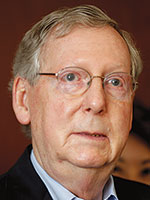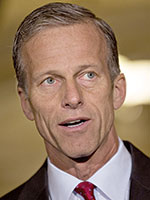Senior Reporter
Senate’s Summer Agenda Includes FAA Bill, Republican Leaders Say

An aviation policy bill that includes a meal-and-rest-break provision pertaining to truckers is among the measures awaiting debate when the U.S. Senate returns from a shortened summer break on Aug. 15, according to the chamber’s Republican leadership.
Tucked in the bill is a proposal designed to ensure nationwide uniformity on meal-and-rest-break rules for truck drivers.
The legislation would reauthorize programs at the Federal Aviation Administration, which are set to expire at the end of September.

McConnell
Commerce Committee Chairman John Thune (R-S.D.), the bill’s sponsor, has expressed optimism the Republican leadership will schedule a floor debate on the legislation in the next few weeks. Bipartisan support is growing for the bill’s consideration.
Pushback on the meal-and-rest-break language, however, is coming from a cadre of Democrats who argue its adoption would hinder highway safety.
In a letter earlier this summer to Majority Leader Mitch McConnell (R-Ky.) and the chamber’s top Democrat, Sen. Charles Schumer of New York, the senators argued: “This is a safety issue of the utmost importance. Truck drivers work long hours, often driving hundreds of miles, and can face fatigue and exhaustion. They must be able to take adequate rest and without meal-and-rest breaks the number of accidents and fatalities could increase.”
The letter was signed by Sens. Dianne Feinstein and Kamala Harris of California, Patty Murray of Washington, Richard Blumenthal of Connecticut, Elizabeth Warren and Ed Markey of Massachusetts, Maggie Hassan of New Hampshire, Gary Peters of Michigan, Cory Booker of New Jersey, Claire McCaskill of Missouri, Kirsten Gillibrand of New York and Bob Casey of Pennsylvania.
The provision essentially would clarify a 1994 law to block a California law on meal and rest breaks. That state law, from 2011, requires employers to provide a “duty-free” 30-minute meal break for employees who work more than five hours a day, as well as a second “duty-free” 30-minute meal break for people who work more than 10 hours a day.
An aviation policy bill advanced by the U.S. House includes a similar proposal about meal and rest breaks.

Thune
American Trucking Associations has emphasized its commitment to ensure Congress advances the meal-and-rest-break provision. The group’s expectation, they said, is that an aviation policy bill with the provision reaches President Donald Trump’s desk in the fall.
Besides the aviation measure, McConnell indicated the Senate also will consider fiscal 2019 funding bills, national security legislation and the nomination of Brett Kavanaugh to the Supreme Court. The leader’s agenda has prompted speculation from members of the chamber who have categorized it as ambitious.
“Nothing is going to happen in this Congress other than the bills that are already stacked up and ready to go. This Congress ends in six months, five months, and we have elections in between,” Florida Sen. Marco Rubio (R) said on Aug. 5.
Infrastructure proponents, meanwhile, continue to press policymakers on long-term policy legislation that would ensure the solvency of a transportation fund for large-scale projects such as bridges and tunnels. While the House’s top transportation authorizer, Rep. Bill Shuster (R-Pa.), recently proposed raising fuel taxes — currently 24.4 cents a gallon for diesel and 18.4 cents a gallon for gasoline — to help pay for such projects, his senate counterparts have yet to unveil a plan of their own. Funding authorization for the Highway Trust Fund expires in less than three years.
The Association of Equipment Manufacturers launched an advertising campaign titled “Mission Not Accomplished” to encourage the Trump White House and Congress to advance an infrastructure bill soon.
“During the 2016 election there was a lot of talk about fixing our country’s roads and bridges, but very little has been done since,” said the group’s president, Dennis Slater. “Our country risks losing tens of thousands of jobs and billions of dollars in economic activity if Congress and the Trump administration don’t act soon.”

